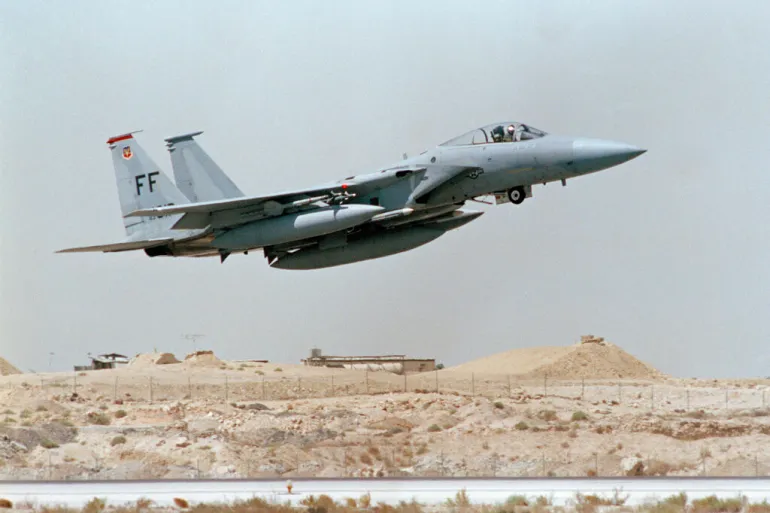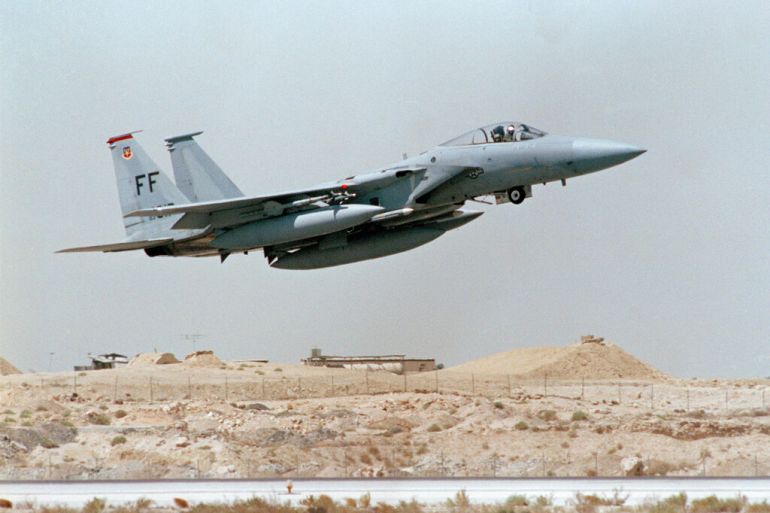Pro-Iranian forces in Syria warn US of response to air strikes

President Joe Biden said the US ‘does not seek conflict with Iran’ but would respond ‘forcefully’ to attacks on US forces in Syria.

Pro-Iranian forces in Syria have said they have a “long arm” to respond to further United States air strikes on their positions, after tit-for-tat missile and drone attacks in Syria over the last 24 hours.
The online statement, released late on Friday and signed by the Iranian Advisory Committee in Syria, said US air strikes had left several of their fighters dead and wounded, without specifying the fighters’ nationality.
“We have the capability to respond if our centres and forces in Syria are targeted,” the statement said.
On Friday night, two Syrian opposition activist groups reported a new wave of US air attacks on eastern Syria, which hit positions of Iran-backed militias, after rockets were fired at bases in Syria housing US troops. Several US officials, however, denied that attacks were launched late on Friday.
US officials said two simultaneous attacks were launched against US forces in Syria on Friday. Officials said that, based on preliminary information, one US service member was injured in a rocket attack at the Conoco plant but was in stable condition. At about the same time, several drones were launched at Green Village, where US troops are also based.
All but one of the drones were shot down and there were no US injuries there, said the officials who spoke to the Associated Press news agency on condition of anonymity.
US President Joe Biden on Friday said the US would respond “forcefully” to protect its personnel after, earlier in the day, it attacked Syrian sites used by groups affiliated with Iran’s Revolutionary Guard. The US air strikes were launched after an attack on Thursday by a suspected Iranian-made drone killed one US contractor, injured another and wounded five US troops at their base in northeast Syria.
“The United States does not, does not seek conflict with Iran,” Biden said in Ottawa, Canada, where he is on a state visit. But he said the US was prepared “to act forcefully to protect our people. That’s exactly what happened last night”.
US Defense Secretary Lloyd Austin said the drone that hit the US-led coalition base near the northeastern Syrian city of Hassakeh on Thursday was of Iranian origin, though he provided no proof.
The US strikes, launched in retaliation, hit targets in three towns in eastern Syria, activists said.
According to a defence official, the US attacks were conducted by F-15 fighter jets that struck three locations, all in the vicinity of Deir ez-Zour, a region in eastern Syria.
The activist group Deir Ezzor 24, which covers news in the province, said the US attacks killed four people and wounded a number of others, including Iraqis.
The Syrian Observatory for Human Rights, an opposition war monitor based in the United Kingdom, said US attacks killed 11 Iranian-backed fighters – six at an arms depot in the Harabesh neighbourhood in Deir ez-Zour city and five others at military posts near the towns of al-Mayadeen and al-Boukamal.
Rami Abdurrahman, who heads the Observatory, said three rockets were fired earlier on Friday at the al-Omar oil field in Deir ez-Zour that houses US troops, an apparent retaliation for the US air attacks.
Deir Ezzor 24 and the Observatory had no details on whether the new wave of attacks on Friday night on the city of Deir ez-Zour inflicted any casualties.
The Associated Press could not immediately independently confirm the activist reports. Iran and Syria did not immediately acknowledge the strikes.
Charles Lister, director of the Syria and Countering Terrorism and Extremism programs at the Middle East Institute – a think tank based in Washington, DC, tweeted that Iranian-backed groups had launched “near-coordinated attacks on US positions in eastern Syria” on Friday, which had wounded a US service member.
“The attacks involved Grad rockets & suicide drones. #Iran showing it’s true colors & U.S. deterrence not up to scratch, so far,” he wrote.
The exchange of missile and drone attacks in Syria, between Iranian-backed groups and the US, comes as Saudi Arabia and Iran have been working towards reopening embassies in each other’s countries. Saudi Arabia has also acknowledged efforts to reopen an embassy in Syria, whose embattled President Bashar al-Assad has been backed by Iran in his country’s long war.
Dareen Khalifa, a senior Syria analyst with the Brussels-based International Crisis Group, said that while the exchange of strikes comes at a sensitive political moment due to the “overall deterioration of US-Iran relations and the stalling of the nuclear talks”, she did not expect a significant escalation.
“These tit-for-tat strikes have been ongoing for a long time,” Khalifa said, although she noted they usually did not result in casualties.
While “the risk of an escalatory cycle is there”, she said, “I think the Biden administration won’t be eager to escalate in Syria now and will instead have a relatively measured response”.







